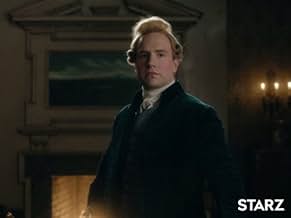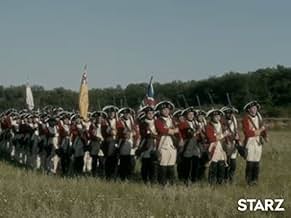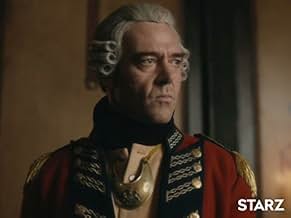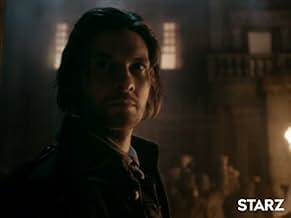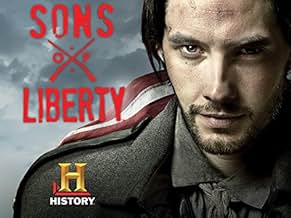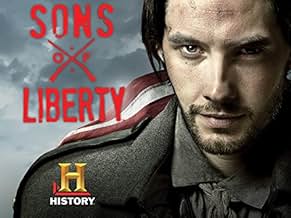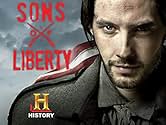The story of a group of very different men fighting in the American Colonies for freedom, and how they will shape the future for the United States of America. Based on true stories.The story of a group of very different men fighting in the American Colonies for freedom, and how they will shape the future for the United States of America. Based on true stories.The story of a group of very different men fighting in the American Colonies for freedom, and how they will shape the future for the United States of America. Based on true stories.
- Awards
- 2 wins & 7 nominations
Browse episodes
Storyline
Did you know
- TriviaFilmed entirely in Romania.
- GoofsThe British flag depicted in the miniseries is historically incorrect. The flag shown didn't exist until 1806 (the union with Ireland).
- ConnectionsReferenced in Chelsea Lately: Episode #8.109 (2014)
Featured review
There has been a tendency lately to "upgrade" works set in historical times be they fictional or true. Operas and plays written 100 and more years ago which take place in Europe during centuries past are being put into places like Las Vegas and California. Even Shakespeare has not been immune from updated versions of his plays, such as the film Richard III in which the medieval king is portrayed as a high-ranking British fascist of the 1930's! The trend is now infiltrating film productions which are supposed to take place in historical settings. One of the worst such productions was the recent HBO "The Tudors". The present History Channel offering of "The Sons of Liberty" is another such offering. At the same there are some good things in the series.
While there is much to be praised about this production, including wonderful sets and effects, the dialog and mannerisms of the characters are so 21st century I kept being reminded that the production was from the 2000's. A good period piece allows the audience to be transported, albeit temporarily, to another time where manners and culture were quite distinct from today. In 18th century Britain and America, class distinctions were highly pronounced and obvious. Working class adults would refer to any of the aristocracy as "sir" or "madam". There would even be the occasional bow from working class males and curtsies engaged by working class women to members of the aristocracy. Working class children would refer to any adult male as "sir", and more than likely, children were told to do things, not asked.
The present production, trying too desperately to appeal to 21st century American sensibilities, throws much of the formalities and mannerisms of 18th century life out the window in favor of more casual interactions. A young boy among the Sons of Liberty is often "asked" to do things, much like they are today, but children were ordered around. And working class children in this production don't use the formal "sir" enough. If an adult wished a child to engage in a task, it was expected to be done, not "would you please..." The expected interaction would be "Do this" with the response "right away, sir." Now, we can debate about whether this kind of treatment was unfair, but that's how it was in the 18th century. Also, working class members would be very formal towards superiors except in private conference.
In an interesting scene, John Hancock throws a party for the birthday of King George III, which was common for colonists and other subjects of Britain. (The custom still occurs today in Britain.) During the party, John Hancock walks and chats with then Lieutenant Governor Hutchinson who ranked just below the governor of Massachusetts and New Jersey who ruled at the behest of Britain and the King. (In a sense, the governor was the voice of the king.) In this context, Hutchinson would definitely be Hancock's superior although both were part of the aristocracy of the colonies. Several times, Hancock turns his back on the lieutenant governor to say hello to other arrivals. This would have been considered a gross faux pas by 18th century standards. You would never turn your back on a ranking official, even a lieutenant governor, in a social occasion to speak to others. You would ask permission to do so, and others would not interrupt if you were in conference with a superior. In other scenes, I heard people saying the epithet "bs", which I don't think existed at that time. People did swear, but never to those of higher rank and certainly not in mixed company.
The most interesting aspect of the series has to do with the behind-the-scenes business deals. These are what the Sons of Liberty did to avoid taxation. Still worth watching but I would have liked the filmmakers to consult with some historians concerning the correct manners and culture of the time. The HBO Series "John Adams" is much more accurate in this regard. This is after all supposed to be a presentation from the History Channel. Why not be as accurate possible, unless executive are worried that younger viewers won't "identify with it? Better than "The Tudors" but not as a good as "John Adams".
While there is much to be praised about this production, including wonderful sets and effects, the dialog and mannerisms of the characters are so 21st century I kept being reminded that the production was from the 2000's. A good period piece allows the audience to be transported, albeit temporarily, to another time where manners and culture were quite distinct from today. In 18th century Britain and America, class distinctions were highly pronounced and obvious. Working class adults would refer to any of the aristocracy as "sir" or "madam". There would even be the occasional bow from working class males and curtsies engaged by working class women to members of the aristocracy. Working class children would refer to any adult male as "sir", and more than likely, children were told to do things, not asked.
The present production, trying too desperately to appeal to 21st century American sensibilities, throws much of the formalities and mannerisms of 18th century life out the window in favor of more casual interactions. A young boy among the Sons of Liberty is often "asked" to do things, much like they are today, but children were ordered around. And working class children in this production don't use the formal "sir" enough. If an adult wished a child to engage in a task, it was expected to be done, not "would you please..." The expected interaction would be "Do this" with the response "right away, sir." Now, we can debate about whether this kind of treatment was unfair, but that's how it was in the 18th century. Also, working class members would be very formal towards superiors except in private conference.
In an interesting scene, John Hancock throws a party for the birthday of King George III, which was common for colonists and other subjects of Britain. (The custom still occurs today in Britain.) During the party, John Hancock walks and chats with then Lieutenant Governor Hutchinson who ranked just below the governor of Massachusetts and New Jersey who ruled at the behest of Britain and the King. (In a sense, the governor was the voice of the king.) In this context, Hutchinson would definitely be Hancock's superior although both were part of the aristocracy of the colonies. Several times, Hancock turns his back on the lieutenant governor to say hello to other arrivals. This would have been considered a gross faux pas by 18th century standards. You would never turn your back on a ranking official, even a lieutenant governor, in a social occasion to speak to others. You would ask permission to do so, and others would not interrupt if you were in conference with a superior. In other scenes, I heard people saying the epithet "bs", which I don't think existed at that time. People did swear, but never to those of higher rank and certainly not in mixed company.
The most interesting aspect of the series has to do with the behind-the-scenes business deals. These are what the Sons of Liberty did to avoid taxation. Still worth watching but I would have liked the filmmakers to consult with some historians concerning the correct manners and culture of the time. The HBO Series "John Adams" is much more accurate in this regard. This is after all supposed to be a presentation from the History Channel. Why not be as accurate possible, unless executive are worried that younger viewers won't "identify with it? Better than "The Tudors" but not as a good as "John Adams".
- classicalsteve
- Jan 27, 2015
- Permalink
- How many seasons does Sons of Liberty have?Powered by Alexa
Details
Contribute to this page
Suggest an edit or add missing content





